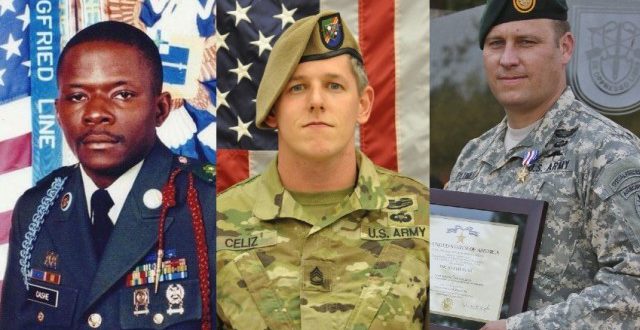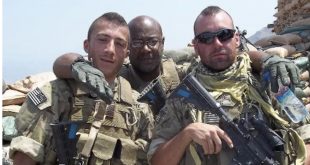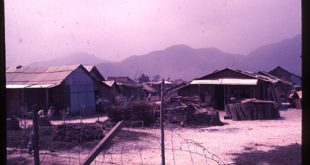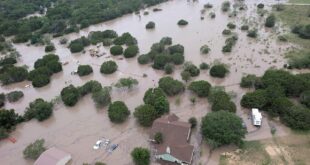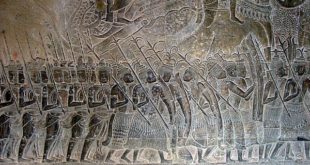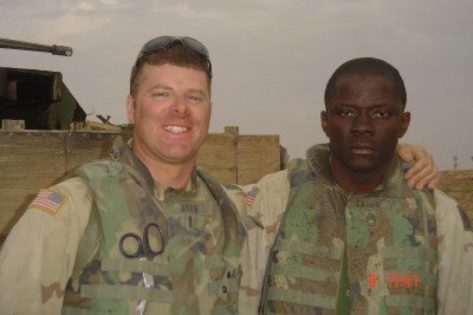
President Joe Biden awarded the nation’s highest military honor to the three during a White House ceremony yesterday. Cashe and Celiz were honored posthumously, while Plumlee received the award in person.
Army Sgt. 1st Class Alwyn C. Cashe
Austin said Cashe’s parents taught him the value of hard work. Cashe’s father would say, “Do it like you’re putting your name on it.”
That’s something Cashe would later instill in his soldiers, Austin said.
One night in October of 2005, Cashe was in a Bradley Fighting Vehicle that rolled onto an improvised explosive device and burst into flames near Samarra, Iraq. Cashe managed to escape from the commander’s hatch, but his soldiers were still inside the burning vehicle, the secretary said.
Cashe went back into the burning vehicle and removed the driver.He then removed four more soldiers, but two were still missing. So, he went back — again and again and again — and Cashe pulled his men out of the flames, Austin said.
Army Sgt. 1st Class Christopher A. Celiz
Celiz was an Army Ranger, who mentored and bonded with his fellow soldiers, Austin said.
When his Rangers came under Taliban attack in Afghanistan, Celiz dodged bullets so he could get to a heavy-weapons system. That gave his team time to find a safe place for evacuation, he said.
When his weapons weren’t enough to hold off the enemy, Celiz used his own body as a shield to protect his team, Austin said.
As the evacuation helicopter was lifting off, enemy fire found Celiz. He knew he was wounded, but, in one of his last acts, he waved for the aircraft to depart without him.
Army Master Sgt. Earl D. Plumlee
In 2013 at Forward Operating Base Ghazni in Afghanistan, Plumlee’s unit was attacked, and the enemy breached his forward operating base.
“Over and over, he advanced on the insurgents, firing whatever weapon that he could get his hands on — a rifle, a pistol, a grenade. Over and over, he put his life on the line. Over and over, he came face-to-face with the enemy — some just seven meters away,” Austin said.
“There’s a common thread among the stories of these men and so many other Medal of Honor recipients. In their acts of heroism, there was no time. No time to blink. No time to breathe. And, certainly no time to think about being brave. And yet they were brave. Brave beyond all expectation,” he said.
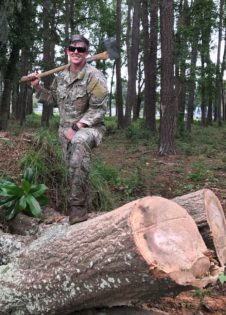
Austin Honors 3 Medal of Honor Recipients
DEC. 17, 2021 | BY DAVID VERGUN, DOD NEWS
Secretary of Defense Lloyd J. Austin III honored Medal of Honor recipients Army Sgt. 1st Class Alwyn C. Cashe, Army Sgt. 1st Class Christopher A. Celiz, and Army Master Sgt. Earl D. Plumlee today at a Hall of Heroes induction ceremony at Conmy Hall at Joint Base Myer-Henderson Hall, Virginia.
President Joe Biden awarded the nation’s highest military honor to the three during a White House ceremony yesterday. Cashe and Celiz were honored posthumously, while Plumlee received the award in person.
Army Sgt. 1st Class Alwyn C. Cashe
Austin said Cashe’s parents taught him the value of hard work. Cashe’s father would say, “Do it like you’re putting your name on it.”
That’s something Cashe would later instill in his soldiers, Austin said.
One night in October of 2005, Cashe was in a Bradley Fighting Vehicle that rolled onto an improvised explosive device and burst into flames near Samarra, Iraq. Cashe managed to escape from the commander’s hatch, but his soldiers were still inside the burning vehicle, the secretary said.
Cashe went back into the burning vehicle and removed the driver.He then removed four more soldiers, but two were still missing. So, he went back — again and again and again — and Cashe pulled his men out of the flames, Austin said.
Army Sgt. 1st Class Christopher A. Celiz
Celiz was an Army Ranger, who mentored and bonded with his fellow soldiers, Austin said.
When his Rangers came under Taliban attack in Afghanistan, Celiz dodged bullets so he could get to a heavy-weapons system. That gave his team time to find a safe place for evacuation, he said.
When his weapons weren’t enough to hold off the enemy, Celiz used his own body as a shield to protect his team, Austin said.
As the evacuation helicopter was lifting off, enemy fire found Celiz. He knew he was wounded, but, in one of his last acts, he waved for the aircraft to depart without him.
Army Master Sgt. Earl D. Plumlee
In 2013 at Forward Operating Base Ghazni in Afghanistan, Plumlee’s unit was attacked, and the enemy breached his forward operating base.
“Over and over, he advanced on the insurgents, firing whatever weapon that he could get his hands on — a rifle, a pistol, a grenade. Over and over, he put his life on the line. Over and over, he came face-to-face with the enemy — some just seven meters away,” Austin said.
“There’s a common thread among the stories of these men and so many other Medal of Honor recipients. In their acts of heroism, there was no time. No time to blink. No time to breathe. And, certainly no time to think about being brave. And yet they were brave. Brave beyond all expectation,” he said.
Valor remembered: three U.S. Soldiers received military’s top honor
By Joseph Lacdan and Devon Suits, Army News Service
The President of the United States will present Medals of Honor to two Soldiers who gave their lives for their comrades and another who fearlessly defended a forward-operating base during actions in Iraq and Afghanistan.
Sgt. 1st Class Alwyn Cashe will receive the award for rescuing teammates from a burning vehicle while ignoring his own injuries in October 2005 near Samarra, Iraq.
Sgt. 1st Class Christopher Celiz will receive the medal for using his body to shield his team and an injured ally from enemy gunfire in the Paktia Province, Afghanistan, in July 2018.
Master Sgt. Earl Plumlee will receive the military’s highest honor for engaging invading insurgents at a U.S. base near Ghazni, Afghanistan, in August 2013.
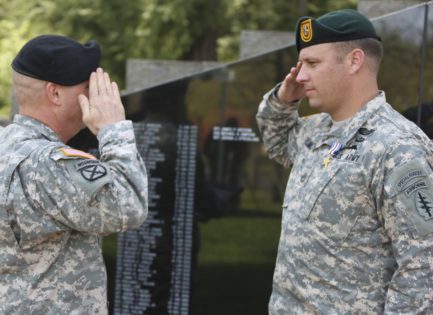
Plumlee
Plumlee served as a weapons sergeant assigned to Charlie Company, 4th Battalion, 1st Special Forces Group (Airborne), at Forward Operating Base Ghazni when enemy forces attacked the complex. Plumlee instantly responded to a massive explosion that caused a 60-foot breach in the base’s perimeter wall.
Ten heavily armed insurgents wearing suicide vests entered the base perimeter through the opening. Plumlee and five other Special Forces Soldiers climbed into trucks and headed to the attack point.
Plumlee’s driver maneuvered the vehicle to provide cover for three injured U.S. Soldiers. With their truck exposed to enemy fire, Plumlee then used his own body to shield his driver from attack.
Plumlee, outnumbered and armed with only a pistol, engaged the enemy fighters. After finding cover behind a plastic water tank, he quickly killed one insurgent with a well-placed grenade. As enemy bullets cracked past his head, he killed another insurgent by firing into another’s suicide vest which detonated.
Still outmanned, Plumlee advanced on the enemy forces again, exposing himself to gunfire as another suicide vest detonated only seven meters from his position. The enemy fighters then unloaded heavy fire upon Plumlee, including several grenades.
The onslaught forced Plumlee to take cover behind a junction panel. Plumlee and another Soldier then mounted a counterattack. The Soldier made his way toward a wounded insurgent, who ignited his suicide vest and the force of the blast sent Plumlee flying backward against a wall.
With his back injured, Plumlee once again found his bearings and engaged the enemy fighters yet another time.
This time, after intense enemy fire forced him to retreat, he joined a group of U.S. and Polish Soldiers. Insurgents tossed hand grenades towards the U.S. troops. Then another insurgent began attacking the U.S. Soldiers from the rear, prompting Plumlee to fire his last two rounds. As the insurgent fell, he then detonated his suicide vest, mortally wounding a U.S. Soldier.
“It was one of the worst gun fights I’ve ever seen,” he said. “And it was happening right where I sleep.”
Several times, Plumlee said, he stood inches from a bullet striking him during the battle. Plumlee did receive wounds when an insurgent suicide-vest attack injured his back.
“It was a crazy day,” he said. “It doesn’t make any sense. How I didn’t get shot, I don’t know. My best guess was because I kept moving. [The insurgents] were always one or two feet behind me.”
Finally, with enemies still within striking distance, he ran amid insurgent fire to aid a wounded Soldier and carried him to safety.
When asked about being awarded the Medal of Honor, Plumlee said the Medal should recognize the efforts of the group.
“It’s just my nature,” Plumlee said. “I’m not used to being singled out for anything positive or negative. Generally the team you’re involved in gets those kinds of accolades. I’m still fairly uncomfortable with it.”
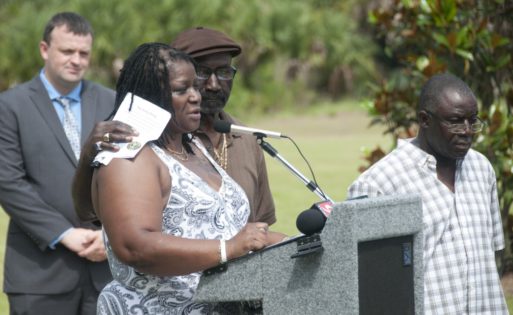
Cashe
Cashe gave his life to save six Soldiers from a burning vehicle while under enemy fire in Iraq on Oct. 17, 2005.
While assigned to Company A, 1st Battalion, 15th Infantry Regiment, 3rd Brigade, 3rd Infantry Division, Cashe was in command of the lead Bradley Fighting Vehicle during a night-time mounted patrol in Samarra, Iraq. The enemy attacked his vehicle with an improvised explosive device and small-arms fire.
The explosion ignited the Bradley’s fuel cell, causing flames to engulf the disabled vehicle. Cashe forced the gunner’s hatch open to evacuate, and immediately shifted his attention to the driver still trapped inside.
With the help of another Soldier, Cashe opened the driver’s hatch and extracted the Soldier, who was on fire. As they extinguished the flames on the driver’s body, Cashe’s fuel-soaked uniform ignited, resulting in severe burns across his body.
Ignoring his painful wounds, Cashe, pulled the driver to a position of safety before returning to the rear of the vehicle to extract personnel trapped inside the troop compartment. Flames continued to engulf the vehicle and could be seen coming out of every portal.
Shortly after, the enemy started to open fire on Cashe’s position. Soldiers on the patrol exchanged gunfire to defend their position, while Cashe opened the troop door to extract additional personnel.
Upon gaining entry, Cashe pushed through the flames to pull four Soldiers from the burning wreckage.
With two Soldiers still missing, Cashe reentered the burning troop compartment to retrieve them. He also recovered the body of an interpreter who had been killed in the explosion.
“Again and again, he continues to go back, soaked in fuel [and] on fire, with no regard for his own safety to get everybody out,” said Maj. Jimmy Hathaway, Cashe’s former company commander, during an interview in 2014.
Reinforcements then arrived to suppress the enemy and establish a casualty collection point.
With second- and third-degree burns covering more than 70 percent of his body, Cashe pushed through the pain and encouraged his Soldiers to receive medical care or be evacuated before himself.
“As we were fighting the fight and clearing the scene, he wouldn’t leave,” Hathaway added. “He wanted to make sure all of his guys were out first even though he was burned over most of his body. He was still more concerned about his guys getting out than he was.”
In the end, 10 Soldiers were wounded, with seven of them sustaining serious wounds.
Cashe died of his wounds on Nov. 8, 2005, at Brooke Army Medical Center in San Antonio, Texas. He was posthumously awarded the Silver Star for his heroic actions.
Cashe’s widow, Tamara, will attend the White House ceremony to accept the Medal of Honor for his extraordinary heroism and selflessness above and beyond the call of duty. Their daughter, Alexis, will also attend the ceremony.
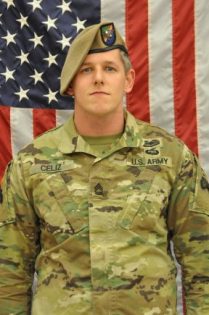
Celiz
Celiz had been nearing the end of his fifth deployment when tragedy struck during a mission in the Paktia Province of Afghanistan.
A well-respected Army Ranger, Celiz earned the admiration of his peers with his selfless attitude. Celiz bonded with his fellow Soldiers both on duty and during family dinners and trips into the wilderness. He also mentored and challenged fellow Soldiers to become better at their duties.
“He didn’t feel like he could do his job without his Soldiers ready and able by his side,” said his widow, Katie. “He always pushed them and he wanted them to push him. He couldn’t be a better person if they didn’t challenge him.”
Then on July 12, Celiz led a special-purpose unit comprised of allies and members of the 1st Battalion, 75th Ranger Regiment, to clear an area of enemy forces. As the team’s mission neared completion, a large contingent of enemy forces unleashed a wave of bullets toward the unit.
The onslaught injured a partnered force member. Celiz, knowing the danger before him, exposed himself to enemy fire as he secured a heavy weapon system, enabling his unit time to reach cover.
As the unit’s leader, Celiz decided to use his body to shield his team as they carried the wounded member to a medical evacuation helicopter.
Even as the enemy machine-gun fire continued to rain upon him, he stood between the medical aircraft and never wavered, even as the onslaught injured him.
In a final, selfless act, he motioned the helicopter to leave rather than attempt to rescue him.
Shortly after, a medical team treated and evacuated Celiz to the nearest medical treatment facility where he died of his wounds.
Celiz’s actions that July day left a lasting impact on friends and family.
The impact of his mentorship became more apparent at Celiz’s funeral, when hundreds of his former teammates, Soldiers and friends filled the synagogue Congregation Mickve Israel in Savannah, Georgia. Celiz had found the Jewish faith later in life and it invigorated him, his wife, Katie, said.
Katie also said that friends and family remembered Celiz for his embrace of others.
“He was always very accepting of everybody,” she said. “In high school, he was friends with everybody; he didn’t discriminate because of your race, creed or who you were. As long as you were a good person, that was all he cared about.”
Celiz is survived by Katie and their daughter.
 Soldier of Fortune Magazine The Journal of Professional Adventurers
Soldier of Fortune Magazine The Journal of Professional Adventurers


